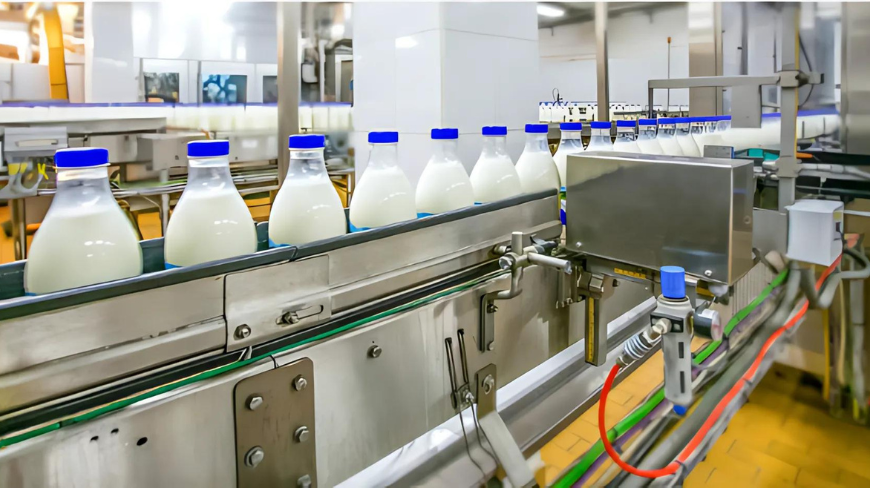In today’s dairy industry, keeping equipment running smoothly is crucial to ensure efficient operations and high-quality products. Equipment breakdowns can cause serious problems, from production delays to product spoilage. That’s where predictive maintenance comes in. It’s a modern solution that allows dairies to predict when equipment might fail and fix it before problems arise.
This is made possible through the dairy erp, which are software tools that help dairies manage all aspects of their operations, including predictive maintenance. These systems also address broader operational challenges, as seen in how ERP software overcomes key challenges in the dairy industry , such as streamlining production and ensuring smoother workflows. Let’s dive into how predictive maintenance works and how ERP systems support it in dairies.
What is Predictive Maintenance?
Predictive maintenance uses real-time data from sensors attached to dairy equipment to predict when a machine or part might break down. By tracking how the equipment is performing, dairies can schedule maintenance at the right time, instead of waiting for a machine to fail.
In traditional maintenance approaches, dairies might service their machines on a set schedule or only after something breaks. With predictive maintenance, however, maintenance is done only when needed. This reduces costs and prevents unexpected equipment failures.
Why is Predictive Maintenance Important in Dairies?
Dairies rely on many machines like pasteurizers, coolers, and packaging systems. If any of these machines break down, it can stop production, spoil products, and lead to financial losses. Predictive maintenance helps dairies avoid these problems by:
- Reducing Downtime:Predictive maintenance helps schedule repairs before a breakdown occurs, keeping production lines running smoothly.
- Saving Money:By only fixing equipment when necessary, dairies can avoid unnecessary maintenance costs.
- Improving Product Quality:Well-maintained machines produce better quality products, helping dairies maintain high standards.
- Extending Equipment Life:Regular, well-timed maintenance prevents equipment from wearing out too quickly, extending its lifespan.
- Boosting Energy Efficiency:Properly maintained equipment uses less energy, saving costs and reducing environmental impact.
The Role of Dairy ERP System in Predictive Maintenance
Dairy ERP system is a comprehensive software tool that manages different parts of a business, such as finance, inventory, production, and maintenance. In dairies, ERP systems are incredibly useful for managing predictive maintenance. Here’s how:
1. Centralizing Data
ERP systems bring together data from different departments into one system. In predictive maintenance, data from sensors on machines can be collected and analyzed in real-time. This makes it easy to monitor equipment performance and spot any issues before they turn into bigger problems.
With all the data in one place, dairy managers can see how equipment is running and get alerts when a machine needs attention.
2. Automatic Alerts and Scheduling
ERP systems can be programmed to send automatic alerts when something is wrong with equipment. For example, if a machine is getting too hot or vibrating too much, the system can notify the maintenance team to take action.
These systems can also automatically schedule maintenance during non-peak hours to avoid disrupting production. This ensures that problems are fixed quickly, preventing breakdowns that could slow down operations.
3. Managing Spare Parts and Inventory
A key part of predictive maintenance is making sure you have the right spare parts available when needed. ERP for dairy helps manage spare parts inventory by tracking what parts are likely to be needed soon.
By integrating predictive maintenance data with inventory management, ERP systems can help dairies stock only the necessary parts, reducing waste and cutting costs. This ensures that when a part needs replacing, it's ready, avoiding delays.
4. Analyzing Historical Data
Dairy ERP solutions store data on equipment performance and maintenance history. This data helps dairies see patterns in machine failures and predict when parts might need replacing. For example, if a particular part tends to wear out after a certain amount of time, the system can suggest replacing it before it causes a problem.
This historical data allows dairies to fine-tune their maintenance schedules, ensuring that equipment is serviced at the right time.
5. Tracking Maintenance Costs
ERP systems make it easy to track how much is being spent on equipment repairs, labor, and part replacements. This helps dairies see the financial benefits of predictive maintenance and whether it’s saving them money.
ERP systems can also generate reports on maintenance activities, showing how often machines are being repaired, how long they’ve been running without problems, and how much downtime has been avoided.
Conclusion:
Predictive maintenance is a valuable tool for dairies, helping them avoid costly equipment failures, minimize downtime, and improve overall efficiency. When paired with ERP systems, predictive maintenance becomes even more powerful. These systems collect and analyze data, schedule repairs, manage inventory, and track costs, making it easier for dairies to keep their equipment in top shape.
For dairies looking to stay competitive and reduce operational risks, predictive maintenance supported by dairy ERP software is a smart investment. Consider the case study of a leading dairy company that implemented PiERP to streamline their production, inventory, supply chain, and retail operations, addressing key challenges such as inefficiencies and high operational costs. With the help of PiERP, this dairy was able to enhance overall efficiency, reduce costs, and ensure smoother operations, proving the value of ERP systems in keeping machinery running smoothly, maintaining product quality, and controlling costs.






